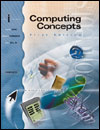|
Black-hat hackers
|
are hackers with malicious intent - they're cyber vandals.
|
 |
 |
 |
|
Computer virus
|
is software that was written with malicious intent to cause annoyance or damage.
|
 |
 |
 |
|
Cookie
|
is a small text file containing specific information about you that is stored on your computer's hard drive.
|
 |
 |
 |
|
Copyright
|
protects an expression of an idea.
|
 |
 |
 |
|
Crackers
|
are hackers who hack for profit.
|
 |
 |
 |
|
Denial of service (DoS) attacks
|
cause thousands of access attempts to a Web site over a very short period of time, overloading the target site and shutting it down.
|
 |
 |
 |
|
Ethics
|
is the set of principles and standards we use in deciding what to do in situations that affect other people.
|
 |
 |
 |
|
Fair Use Doctrine
|
says that you may use copyrighted material in certain situations.
|
 |
 |
 |
|
Firewall
|
is hardware and/or software that protects computers from intruders.
|
 |
 |
 |
|
Hackers
|
are very knowledgeable computer users who use their knowledge to invade other people's computers.
|
 |
 |
 |
|
Hacktivists, or cyber terrorists
|
are politically motivated hackers.
|
 |
 |
 |
|
Identity theft
|
is the impersonation by a thief of someone with good credit.
|
 |
 |
 |
|
Macro viruses
|
are viruses that spread by binding themselves to software like Word or Excel.
|
 |
 |
 |
|
Malware
|
is malicious software that is designed by people to attack some part of a computer system.
|
 |
 |
 |
|
NCIC (National Crime Information Center)
|
is a huge database with information on the criminal records of more than 20 million people.
|
 |
 |
 |
|
Netiquette
|
is good manners or courtesy in cyberspace.
|
 |
 |
 |
|
Pirated software
|
is copyrighted software that is copied and distributed without permission of the owner.
|
 |
 |
 |
|
Privacy
|
is the right to be left alone when you want to be, to have control over your own personal information, and not to be observed without your consent.
|
 |
 |
 |
|
Script bunnies or script kiddies
|
are people who would like to be hackers but don't have much technical expertise.
|
 |
 |
 |
|
Sniffer
|
is software that sits on the Internet analyzing traffic.
|
 |
 |
 |
|
Spam
|
is electronic junk mail, i.e. unsolicited mail, usually from commercial businesses attempting to sell you products and services.
|
 |
 |
 |
|
Spoofing
|
is forging the return address on an e-mail so that the e-mail message appears to come from someone other than the sender.
|
 |
 |
 |
|
Virus hoax
|
is e-mail distributed with the intention of frightening people about a non-existent virus.
|
 |
 |
 |
|
White-hat hackers
|
who follow a "hackers' code" and, while they break into computers they have no right to access, they often report the security leaks to the victims.
|
 |
 |
 |
|
Worm
|
is a computer virus that spreads itself, not only from file to file, but from computer to computer via e-mail and other Internet traffic.
|




 2002 McGraw-Hill Higher Education
2002 McGraw-Hill Higher Education